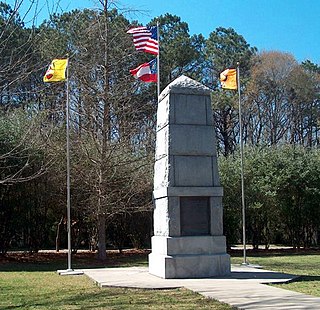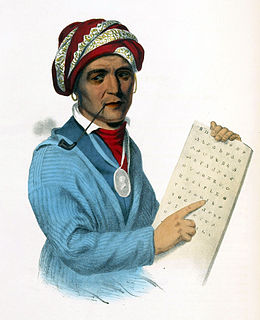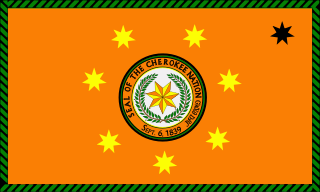Related Research Articles
The Cherokee are one of the indigenous people of the Southeastern Woodlands of the United States. Prior to the 18th century, they were concentrated in their homelands, in towns along river valleys of what is now southwestern North Carolina, southeastern Tennessee, edges of western South Carolina, northern Georgia and northeastern Alabama.

The Trail of Tears was part of a series of forced relocations of approximately 100,000 Native Americans between 1830 and 1850 by the United States government known as the Indian removal. Members of the Cherokee, Muscogee (Creek), Seminole, Chickasaw, and Choctaw nations were forcibly removed from their ancestral homelands in the Southeastern United States to areas to the west of the Mississippi River that had been designated 'Indian Territory'. The forced relocations were carried out by government authorities after the passage of the Indian Removal Act in 1830. The Cherokee removal in 1838 was brought on by the discovery of gold near Dahlonega, Georgia in 1828, resulting in the Georgia Gold Rush.

Cherokee spiritual beliefs are held in common among the Cherokee people – Native American peoples who are indigenous to the Southeastern Woodlands, and today live primarily in communities in North Carolina, and Oklahoma. Some of the beliefs, and the stories and songs in which they have been preserved, exist in slightly different forms in the different communities in which they have been preserved. But for the most part, they still form a unified system of theology.

Tahlequah is a city in Cherokee County, Oklahoma located at the foothills of the Ozark Mountains. It is part of the Green Country region of Oklahoma and was established as a capital of the 19th-century Cherokee Nation in 1839, as part of the new settlement in Indian Territory after the Cherokee Native Americans were forced west from the American Southeast on the Trail of Tears.

The Piper PA-28 Cherokee is a family of two-seat or four-seat light aircraft built by Piper Aircraft and designed for flight training, air taxi and personal use. The PA-28 family of aircraft comprises all-metal, unpressurized, single-engined, piston-powered airplanes with low-mounted wings and tricycle landing gear. They have a single door on the right side, which is entered by stepping on the wing.

Cherokee is an endangered-to-moribund Iroquoian language and the native language of the Cherokee people. Ethnologue states that there were 1,520 Cherokee speakers out of 376,000 Cherokee in 2018, while a tally by the three Cherokee tribes in 2019 recorded ~2,100 speakers. The number of speakers is in decline. About eight fluent speakers die each month, and only a handful of people under the age of 40 are fluent. The dialect of Cherokee in Oklahoma is "definitely endangered", and the one in North Carolina is "severely endangered" according to UNESCO. The Lower dialect, formerly spoken on the South Carolina–Georgia border, has been extinct since about 1900. The dire situation regarding the future of the two remaining dialects prompted the Tri-Council of Cherokee tribes to declare a state of emergency in June 2019, with a call to enhance revitalization efforts.

Sequoyah (c.1770–1843), was a Native American polymath of the Cherokee Nation. In 1821 he completed his independent creation of a Cherokee syllabary, making reading and writing in Cherokee possible. His achievement was one of the few times in recorded history that a member of a pre-literate people created an original, effective writing system. His creation of the Syllabary allowed the Cherokee nation to be one of the first Indigenous groups to have an established and functional language. Sequoyah was also an important representative for the Cherokee nation, by going to Washington, D.C. to sign two relocations and trading of land treaties.
Cherokee Nations v. Georgia, 30 U.S. 1 (1831), was a United States Supreme Court case. The Cherokee Nation sought a federal injunction against laws passed by the U.S. state of Georgia depriving them of rights within its boundaries, but the Supreme Court did not hear the case on its merits. It ruled that it had no original jurisdiction in the matter, as the Cherokees were a dependent nation, with a relationship to the United States like that of a "ward to its guardian," as said by Justice Marshall.

The Cherokee syllabary is a syllabary invented by Sequoyah in the late 1810s and early 1820s to write the Cherokee language. His creation of the syllabary is particularly noteworthy as he was illiterate until the creation of his syllabary. He first experimented with logograms, but his system later developed into a syllabary. In his system, each symbol represents a syllable rather than a single phoneme; the 85 characters provide a suitable method to write Cherokee. Although some symbols resemble Latin, Greek, Cyrillic, and Glagolitic letters, they are not used to represent the same sounds.

Cherokee is a census-designated place (CDP) in Swain and Jackson counties in Western North Carolina, United States, within the Qualla Boundary land trust. Cherokee is located in the Oconaluftee River Valley around the intersection of U.S. Routes 19 and 441. As of the 2010 census, the CDP had a population of 2,138. It is the capital of the federally recognized Eastern Band of Cherokee Indians, one of three recognized Cherokee tribes and the only one in North Carolina.

The Cherokee Outlet, or Cherokee Strip, was located in what is now the state of Oklahoma in the United States. It was a 60-mile (97 km) wide parcel of land south of the Oklahoma-Kansas border between the 96th and 100th meridians. The Cherokee Outlet was created in 1836. The United States forced the Cherokee Nation of Indians to cede to the United States all lands east of the Mississippi River in exchange for a reservation and an "outlet" in Indian Territory. At the time of its creation, the Cherokee Outlet was about 225 miles (360 km) long. The cities of Enid, Woodward, Ponca City, and Perry would later be founded within the boundaries of what had been the Cherokee Outlet.

The Jeep Grand Cherokee is a range of mid-size SUVs produced by the American manufacturer Jeep. While some other SUVs were manufactured with body-on-frame construction, the Jeep Grand Cherokee has always used a unibody chassis.

The Eastern Band of Cherokee Indians (EBCI), is a federally recognized Indian Tribe based in Western North Carolina in the United States. They are descended from the small group of 800-1000 Cherokee who remained in the Eastern United States after the US military, under the Indian Removal Act, moved the other 15,000 Cherokee to west of the Mississippi River in the late 1830s, to Indian Territory. Those Cherokee remaining in the East were to give up tribal Cherokee citizenship and to assimilate. They became US citizens.

The Anglo–Cherokee War, was also known from the Anglo-European perspective as the Cherokee War, the Cherokee Uprising, or the Cherokee Rebellion. The war was a conflict between British forces in North America and Cherokee bands during the French and Indian War. The British and the Cherokee had been allies at the start of the war, but each party had suspected the other of betrayals. Tensions between British-American settlers and Cherokee warriors of towns that the pioneers encroached on, increased during the 1750s, culminating in open hostilities in 1758.

The Cherokee Nation, also known as the Cherokee Nation of Oklahoma, is the largest of three Cherokee federally recognized tribes in the United States. It was established in the 20th century and includes people descended from members of the Old Cherokee Nation who relocated, due to increasing pressure, from the Southeast to Indian Territory and Cherokee who were forced to relocate on the Trail of Tears. The tribe also includes descendants of Cherokee Freedmen, Absentee Shawnee, and Natchez Nation. Over 299,862 people are enrolled in the Cherokee Nation, with 189,228 living within the state of Oklahoma.
Cherokee Studios is a recording facility in Hollywood, California, founded in 1972. Cherokee's owner and manager is Bruce Robb. In his autobiography, Beatles producer George Martin dubbed Cherokee Studios the best studio in America.
Joyce Dugan is an American educator, school administrator, and politician; she served as Principal Chief of the federally recognized Eastern Band of Cherokee Indians (1995-1999), based in Western North Carolina. She was the first woman to be elected to this office and to date is the only one.
The Cherokee Freedmen Controversy was a political and tribal dispute between the Cherokee Nation of Oklahoma and descendants of the Cherokee Freedmen regarding the issue of tribal membership. The controversy had resulted in several legal proceedings between the two parties from the late 20th century to August 2017.

The Cherokee in the American Civil War were active in the Trans-Mississippi and Western Theaters. In the east, Confederate Cherokees led by William Holland Thomas hindered Union forces trying to use the Appalachian mountain passes of western North Carolina and eastern Tennessee. Out west, Confederate Cherokee Stand Watie led primarily Native Confederate forces in the Indian Territory, in what is now the state of Oklahoma. The Cherokee partnered with the Confederacy in order to get funds, as well as ultimately full recognition as a sovereign, independent state.

The Cherokee Nation was a legal, autonomous, tribal government in North America recognized from 1794 to 1907. It was often referred to simply as "The Nation" by its inhabitants. The government was effectively disbanded in 1907, after its land rights had been extinguished, prior to the admission of Oklahoma as a state. During the late 20th century, the Cherokee people reorganized, instituting a government with sovereign jurisdiction known as the Cherokee Nation. On July 9, 2020, the United States Supreme Court ruled that the Muscogee (Creek) Nation had never been disestablished in the years before allotment and Oklahoma Statehood.